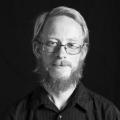Pope Francis mania is in the air in Washington, D.C. right now — his visit next week has the entire city abuzz. To capitalize on this, and to draw attention to the often-neglected problem of nuclear weapons (to which Sojourners devoted its August issue), the Kroc Center for Peace convened "The Pope and the Bomb," a panel of eminent Catholics and those involved in nuclear abolition work to discuss the contribution that Pope Francis has already made to these questions. Opinion writer for The Washington Post E.J. Dionne moderated a panel with Bishop Cantú of the Diocese of Las Cruces, Dr. Love of Catholic University of America, and Senator Nunn of the Nuclear Threat Initiative. Together, they agreed that Pope Francis' moral leadership was essential in giving a vision of a nuclear free world — and that there was a plausible, though difficult, route to achieving that end.
As Bishop Cantú pointed out, the name of the event ought to have been, "The Popes and the Bomb." Pope Francis is not an innovator in his approach to the topic of nuclear weapons (though he did extend the logic of earlier ethical thought). The consistent teaching of the Roman Catholic Church since Pope John XXIII has been that the use of nuclear weapons in war is immoral because it conflicts with the principles of just war theory. Problematically for the principles, the violence wrought through nuclear war is extensive enough that there can be plausible victor in a nuclear exchange, and no chance to protect noncombatants from becoming involved. In short, the church teaches, the use of nuclear weapons is indiscriminate and always disproportionate to the good that can be hoped to be achieved.
Pope Francis' whole papal agenda was brought into focus by Dr. Love when she summarized his mission as care for the three 'P's — his concern for the poor, for the planet, and for peace. Various elements of this are obvious from his Laudato Si', among other addresses and initiatives, but all three of these come together in Francis' concern to see a world free from the threat of nuclear weapons and potential of nuclear catastrophe.
The cost of development and maintenance of nuclear weapons (of which Pope Francis would be well aware, as Dr. Love pointed out, given the history of the Argentine nuclear program) can be considered a theft from the poor — taking from the common good what is owed to them. More than this, even the testing of nuclear weapons has hugely negative environmental effects, which greatly harm people and wildlife. Pope Francis, as what Dr. Love calls a "humble man in a selfie age," has the moral authority to stand up to this theft from and assault on the poor and the planet.
Sen. Nunn's contribution to the panel was much more practical, which was fitting in light of his expertise on the policy issues. He recognized the critical importance of moral arguments, but also pointed out that moral arguments without a pragmatic path forward can leave the public mired in “cynical realism." He pointed to the necessity of a pathway to a nuclear-free world, as well as the vision — which bodies such as the Roman Catholic Church can provide — of a world without nuclear weapons.
"The power of the atom is God's ultimate test of mankind," Sen. Nunn argued.
The atom has immense peaceful scientific, medical, and industrial applications, yet it also provides us with the capacity to choose violence, in a way in which we have not been able to in the past, and to make our entire world uninhabitable.
As E.J. Dionne quoted Pope Francis saying, "War begets war and violence begets violence." The consensus of today's panel was that we had only avoided war and catastrophic nuclear exchange thus far because of God's sheer providence. The United States has an existential stake in the Russian warning system (and vice versa), and we have only God to thank that it has continued to work.
The panel today pointed to a way forward combining a moral imperative for a nuclear-free world with a concrete set of policy proposals to see that come about. More hard work is necessary. But we cannot live with a resigned realism. We need to foster hope — which, as Dr. Love put it, is part of our DNA as Christians — that a world free of nuclear weapons is possible.
Got something to say about what you're reading? We value your feedback!

